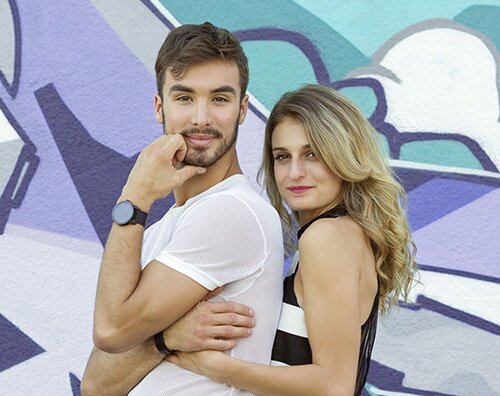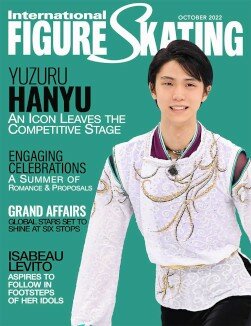
Ask Gabriella Papadakis and Guillaume Cizeron to sum up their 2016-17 season, and it does not take long for both halves of the French ice dance team to comment on the difficulties they had to overcome.
And it goes far beyond the fact that, for the first time in three years, they did not finish the season as World champions. Delve a little deeper, and both Papadakis and Cizeron will tell you about a highly intricate free dance that took until the World Championships in Helsinki to execute in a way that satisfied the highly ambitious couple.
There was also the considerable shadow cast by Tessa Virtue and Scott Moir, the Canadian duo whose comeback after a two-year hiatus quickly became the talk of the ice dance world — even with Papadakis and Cizeron entering the season as two-time World champions. Though the two teams share the same coaches and training ice in Montréal — and, one would imagine, a certain sense of familiarity with each other — competing against the Canadians was a severe test of wills for the French.
But, with the benefit of hindsight to draw upon, Papadakis and Cizeron can now see the positives in everything they had to battle through — and how it can help them heading into the Olympic season, where a golden opportunity is at hand. “Our season was like that free program — we had a lot of obstacles in our way,” said Cizeron. “It was hard to adjust to everything that was new last year. We learned a lot of things. It was one of those seasons in which we learned the most. The difficulties made our partnership stronger and it made the team stronger. It was a really hard season to go through.
“After Worlds, I was so relieved. It felt really good to get into the Olympic season. I was really excited about that. It’s really important that we learn lessons from last year. I think we have grown up a lot.”
Papadakis echoed that sentiment, calling it “a very, very hard season. It was tough, but at the same time, I learned more in the past season than I ever did in my whole career.”
Their free dance, set to a medley of music — “Stillness,” “Oddudua” and “Happiness Does Not Wait” — required an entire season’s worth of learning, and not just for the two skaters. “It was a program that was hard for everyone to digest,” Cizeron said. “It was a program that needed to be watched a few times to be really appreciated. It was hard even for us to feel like we were on the right path and in the right place during the program; to feel right and have everything connecting and everything making sense.
“We put ourselves in a zone that wasn’t comfortable, and we had to adjust a lot in the first half of the season. It needed a lot of time to process, even for us. We finally performed it as it was supposed to be at Worlds last season, but we could have still worked on it for one more year.”
While Papadakis and Cizeron both freely admit that they like taking risks and stretching boundaries when they create new programs, this was the challenge of their still-young career. “We had a hard time working with the music we chose,” said Papadakis. “That was the intention — we wanted to do something hard and that’s what happened. It wasn’t music that was clear, it wasn’t music that called for specific emotions or movements or stuff like that. It’s not music that, you close your eyes and you see exactly what the composer wanted to express.
“So, it was hard in that way and, also, to make the people understand what we wanted to say, because we didn’t understand the music completely and we didn’t know what to express. And Tessa and Scott coming back was hard, too. It didn’t help.”
The French team crossed paths with Virtue and Moir at three competitions throughout last season — NHK Trophy, the Grand Prix Final and Worlds — and the Canadians prevailed every time. While Papadakis and Cizeron were more than aware of their rivals’ history, it was the impact of Virtue and Moir’s presence — and the reputation that came along with it — that proved the most difficult to handle.
“We were never used to having that kind of competition before, so that was a hard thing to deal with,” Papadakis admitted. “They brought with them such a huge past, and people, of course, gave big attention to them. They deserve it, but it was a hard thing to be on the ice with them, feeling this attention around them, knowing their past medals and their whole career.
“We’re very young, and we were never used to dealing with these things, so we started working on it very seriously — mentally working on it. We never had a mental coach before, but we started working with one because of that.”
On the plus side, however, if the French needed an extra push to improve their own game … it lies in the Gadbois facility in Montréal, where they train under the tutelage of Romain Haguenauer, Marie-France Dubreuil, Patrice Lauzon and Pascal Denis.
“As a competitor, you always want to win, right? But you can’t always win,” said Cizeron. “We haven’t had a perfect season since two years ago (when they won their first World title in Shanghai in 2015). We’ve won and we’ve lost. I don’t think being second is losing, really. It’s a nice challenge in our way.
“Having Tessa and Scott here is pushing us further. It is less comfortable, I would say, but it’s really interesting as a competitor to have good rivals. It makes it exciting.”
CLOSING THE GAP
Papadakis and Cizeron saved the best for last in Helsinki. While Virtue and Moir stood atop the World podium, the French team scored a not-so-small victory by winning the free dance, with a World record score of 119.15. The audience at Hartwall Arena was entranced by the program’s power and beauty, and some in the crowd were seen weeping when it was over — so emotional was its pull.
Psychologically, it was just what Papadakis and Cizeron needed to close out the season. “That was a very, very good way to end the year,” said Papadakis. “At Worlds, the short dance wasn’t good, but finishing with the free dance like that … it was amazing. Knowing we can beat them is going to be helpful, but also knowing why we won and why we skated as well as we did.
“After the short dance, we talked and asked ourselves, ‘Wait, why are we competing … when we are competing, we skate bad. Tomorrow, we’re going to the rink and we’re going to skate, and that’s it — not compete, not think about the other people, just skate our hearts out. We don’t care about the result; we don’t care about what we did today in the short dance. We just care about skating our hearts out and making art, that’s it.’ That helped us — that’s why we skated that good.
“The past years, we were doing it naturally because we didn’t have that much pressure and it wasn’t hard then to think like that. But this year it was. We realized what we needed to change and that’s something we need to work on this year, to keep the right intentions when we skate.”
Cizeron also felt the result validated their choice to go in such a different direction with their free program, and called it “a step forward for ice dance. It’s nice to open the door to new things. It kind of shows that the judges are also willing to be open to new things and open to really appreciate skaters who are different,” he said.
“We were really proud of it and it gives us a lot of confidence going into this season. It wasn’t an easy World Championships. It was really hard going into the free dance, knowing that we wouldn’t be able to win — there was no option for that, really (they trailed Virtue and Moir by nearly six points after the short).
“But I think that’s what made us perform that way. We didn’t have to compete anymore. We knew we wouldn’t be first, so we thought, ‘let’s skate, let’s have fun and let’s do what we know how to do.’”
CREATIVE CHANGES
On the advice of the French federation, Papadakis and Cizeron turned to the 1984 Olympic ice dance champion, Christopher Dean, to craft their short program for the Olympic season. “That was a very nice partnership. We got along really well and we had a very good connection, doing the choreography,” Cizeron said of Dean, who worked wih the couple in Montréal in early July. “That was the first time I really met him. He’s a very inspiring guy.”
Working with Dean was also something that Papadakis said her mother, Catherine — the couple’s first coach in France and a longtime fan of the British ice dance legend — was thrilled about. “Since I was little, she showed me a lot of videos that she loved. She was a big, big fan of Christopher Dean, so she showed me a lot of his skating,” Papadakis explained. “She was so happy to hear about this.”
Dubreuil choreographed the free dance, which Papadakis said will be skated to music that will be much more recognizable than last season’s selections. “Our goal with the choreography was to do something different, something that people would not expect with this kind of music. We had kind of a precise idea of what we wanted to do, which was good because the last two years it was a hard thing to decide.”
Cizeron said choosing the music was a “pretty easy decision because we already had a few ideas in our heads. Everyone was agreeing with the ideas, so that went pretty fast. “There is a nice contrast this year between the short and long programs. It is going to be a lot of fun to have two programs that are completely different.”
Though being different and stretching boundaries with their free programs are important to Papadakis and Cizeron, it is never done just for effect. “We want to say something, we want to bring something bigger from ourselves,” Cizeron said. “We always end up asking ourselves the same questions: Why are we doing this, why are we committing to this (program) and this art? What is it that we want to say through this? That’s the fundamental question that makes us want to go further and break those boundaries.
“We don’t break boundaries just to break boundaries. We always look for something to express about ourselves or about the world or about people. That’s kind of how we process things with the free program. It’s a very long process, and what’s nice about this is we never know where we’re going to end up.”
What they do know is there is still more to give, more lessons to learn, and more room to grow. “We learn every day, and that’s what is so amazing about this sport,” said Cizeron. “I feel skating is a really hard sport because it combines so many disciplines — it’s skating skills; it’s interpretation; it’s artistic. You learn about relationships, you learn about so many different things. You can never be perfect in every area. I believe I’ll always be able to be a better dancer, a better skater, have better technique, and a better connection with my partner. It’s a process that never ends.”
OLYMPIC STRATEGY
Papadakis and Cizeron, who will compete on the biggest sporting stage of them all for the first time in 2018, will be anything other than “happy to be here” competitors in PyeongChang.
They are going there to win.
Cizeron said that he and Papadakis always knew that they would go to the Olympics, “but I don’t think either of us would have thought we would be going with a chance to win. “There are not a lot of athletes who go to the Olympics for the first time and know they have a chance to win. I think we started believing that two years ago when we won our first World Championship. Then it was ‘OK, maybe we can actually do this.’
“We have a really strong coaching team and they have a lot of experience. They’ve been to the Olympics many, many times, and we can rely on them and their experience to guide us and help us bring out the best of ourselves.”
While winning a gold medal is well within their capabilities, Papadakis and Cizeron will not allow themselves to fall into the “it is gold or bust” mentality heading into the 2018 Olympic Winter Games. Given their still tender ages as ice dancers — they are both just 22 years old — it is not likely to be their only Olympics. Both said 2022 in Beijing is most definitely part of their future plans.
“Of course, a gold medal at the Olympics is a huge thing — it’s too big for me to actually imagine what it would feel like right now. I can’t imagine it,” said Papadakis. “I try not to put too much emphasis on it. So often, others say I put so much pressure on reaching my goal that when I didn’t succeed, it felt like my whole life was ruined. I don’t want to feel that. It’s also the kind of pressure that stops us from skating the way we can and we should.”
Cizeron said that aside from everything that surrounds the Olympic experience “we don’t have to do anything that we really can’t do.”
“I want to win the Olympics and they (Virtue and Moir) want it, too,” Papadakis added. “We’re not going into this season equal, but starting this year I see myself like that because we are trying to achieve the same goal.”
(Originally published in the IFS October 2017 issue)





